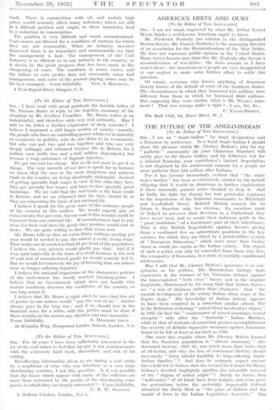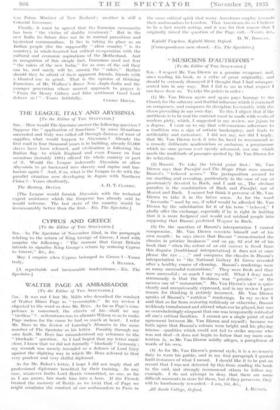THE FUTURE OF THE ANGLO-INDIAN [To the Editor of THE
SPECTATOR.] SIR,—I am 'an " Anglo-Indian by inept designation and a Eurasian by preference. As a loyal Anglo-Indian I should share the pleasure which Mr. Glorney Bolton's plea for My " pathetic " community (in your Christmas .N.Tumber) will surely give to Sir' Henry Gidney and his folloWers, but Lir a rational Eurasian your contributor's blatant ImperialisM is not disguised by his sentimental concern for a people no more pathetic than 350 million other Indians.
For it has become increasingly evident that " the white
man's burden " has been so extensively carried by his hybrid offspring that it would be disastrous to further exploitation if these unusually 'patient mules decided to drat) it. And in India the fight for Swaraj has lent particular emphasis to the importance of the Eurasian community to Whitehall and Leadenhall Street. Belated British concern for its future is therefore only too obvious. Its members must be helped to preserve their devotion to a Fatherland they have never seen, and to retain their ludicrous pride in the "-great traditions " of a fractionate part of their inheritance That is why British Imperialistic opinion favours giving them a continued lien on subordinate positions in the key services, for which they are fitted by a priest-ridden systent of " European Education," which costs more than twelve times as much per capita as the Indian va tie ty. The object of such a policy can only be concealed from those who live, like a majority of Eurasians, in a state of carefully conditioned
adolescence. • • May I add' that Mr. Glorney Bolton's ignorance is as Con.
spicuous as his politics. His Bumbledom biology finds expression in the manner of his Victorian defence against the long-exploded " both vices " theory and in the singultir ineptitude, illuminated 'by his smug libel that Indian degrees are " a test of slickness rather than character," that " the mental development of the young Indian . often stops at the degree stage." His knowledge - of Indian history appears to have been acquired in a somewhat similar school. For in the Boltonian reckoning " mixed blood involved no stigma " in 1835 (in fact the " countenance of mixed marriages ceased abruptly" only after the " shameful " Indian • Mutiny), while in that of students of somewhat greater accomplishment the severity of definite repressive measures against Eurasians began to be felt at least as far back as 1780.
One must also enquire where Mr. Glorney Bolton learned that the Eurasian population is " almost stationary " (the decennial increase, 1921-31, was much more than twice that of all-India), and why the loss of communal identity should necessarily " bring untold hardship to long-suffering Anglo- Indian families " ? And does lie seriously expect anyone but a half-wit to believe that the reward for Colonel Sir Henry Gidney's devoted Anglophily signifies the Ostensible renioval of the • " stigma of mixed origin " ? Surely he knows that "half-castes " of all kinds have been knights and even peers for generations before the • sartorially impeccable Colonel attracted the Daily Mail as "the glass or fast] ion and the mould of form in the 'Indian Legislative Assc ably ." One
was Prime Minister of New Zealand another is still Colonial Governor.
Finally, it must be agreed that the Eurasian community has been " the victim of shabby treatment." But in the new India its future does not lie in mutual parasitism and hysterical communalism. It lies in taking its place as an- Indian people (for the supposedly " alien country" is its country), in whole-hearted but critical co-operation with the cultural and economic aspirations of the Motherland. And in recognition of this simple fact., Eurasians need not fear " the rulers of the new India," for as sons of. the .soil they can be, and surely will be, among the " rulers." Rather should they be afraid of their apparent friends, friends with a blunted axe to grind. That is the opinion of thinking Eurasians, of Mr. Wallace's Brave. New Anglo-India and the younger generation whose nearest approach to prayer is " From Sir Henry Gidncy and false sentiment Good Lord deliver us I "-- -Yours faithfully, CEDRIC DOVER.













































 Previous page
Previous page